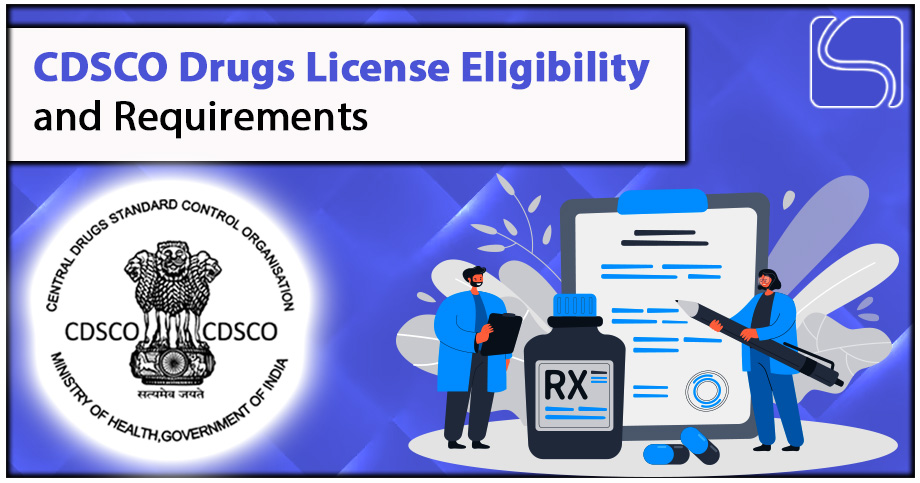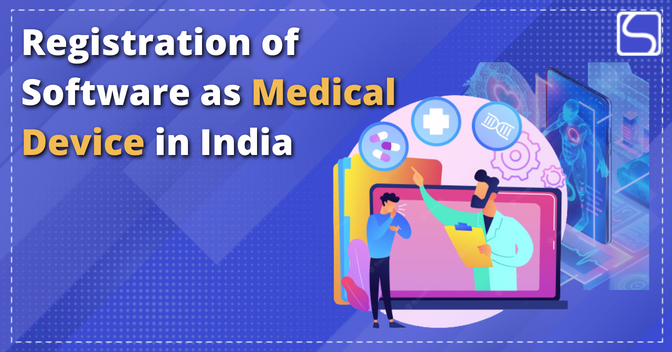CDSCO Drugs License Eligibility and Requirements

Shivam Narwal | Updated: Mar 17, 2023 | Category: CDSCO
The Central Drugs Standard Control Organization (CDSCO) is the regulatory authority in India responsible for approving drugs for human and veterinary use. The CDSCO issues licenses to pharmaceutical companies, drug manufacturers, wholesalers, and retailers, ensuring that the drugs available in the Indian market meet safety and quality standards.
In this blog, we will discuss the eligibility criteria and requirements for obtaining a CDSCO drug license.
Table of Contents
Types of CDSCO Drug Licenses
Before discussing the eligibility criteria, let’s first understand the types of drug licenses issued by CDSCO.
- Manufacturing License: This license is required for any person or company that intends to manufacture drugs in India. The license is granted based on the manufacturing site’s compliance with Good Manufacturing Practices (GMP) guidelines.
- Wholesale License: This license is required for businesses engaged in the wholesale distribution of drugs. A wholesale license allows businesses to purchase drugs from manufacturers and sell them to retailers, hospitals, and clinics.
- Retail License: This license is required for businesses engaged in the retail sale of drugs. A retail license allows businesses to sell drugs directly to consumers.
- Loan License: This license is issued to a person or company who intends to manufacture drugs but does not have a manufacturing facility. A loan license allows the licensee to use another company’s manufacturing facility to produce drugs.
Eligibility Criteria for CDSCO Drug License
Now that we have understood the different types of drug licenses, let’s discuss the eligibility criteria for obtaining a CDSCO drug license.
- Manufacturing License Eligibility Criteria
The following entities are eligible to apply for a manufacturing license:- A company registered under the Companies Act, 1956 or Companies Act, 2013.
- A partnership firm registered under the Partnership Act, 1932[1].
- A proprietorship firm registered under the Shops and Establishment Act.
- A society registered under the Societies Registration Act, 1860.
- A trust registered under the Indian Trust Act, 1882.
- A government-owned agency.
- Wholesale License Eligibility Criteria
The following entities are eligible to apply for a wholesale license:- A company registered under the Companies Act, 1956 or Companies Act, 2013.
- A partnership firm registered under the Partnership Act, of 1932.
- A proprietorship firm registered under the Shops and Establishment Act.
- A society registered under the Societies Registration Act, 1860.
- A trust registered under the Indian Trust Act, 1882.
- A government-owned agency.
- Retail License Eligibility Criteria
The following entities are eligible to apply for a retail license:- A company registered under the Companies Act, 1956 or Companies Act, 2013.
- A partnership firm registered under the Partnership Act, 1932.
- A proprietorship firm registered under the Shops and Establishment Act.
- A society registered under the Societies Registration Act, 1860.
- A trust registered under the Indian Trust Act, 1882.
- A government-owned agency.
- Loan License Eligibility Criteria
The following entities are eligible to apply for a loan license:- A company registered under the Companies Act, 1956 or Companies Act, 2013.
- A partnership firm registered under the Partnership Act, 1932.
- A proprietorship firm registered under the Shops and Establishment Act.
- A society registered under the Societies Registration Act, 1860.
- A trust registered under the Indian Trust Act, 1882.
- A government-owned agency.
Requirements for CDSCO Drug License
Apart from meeting the eligibility criteria, applicants also need to fulfill certain requirements to obtain a CDSCO drug license. Let’s take a look at the requirements for each type of license:
- Manufacturing License Requirements
a. Premises: The manufacturing site must meet the requirements of Schedule M of the Drugs and Cosmetics Act, 1940. The site should have adequate space for the storage of raw materials and finished products, as well as facilities for manufacturing, testing, and packaging.
b. Personnel: The manufacturing site should have qualified personnel, including a production manager, a quality control manager, and a quality assurance manager.
c. Equipment: The manufacturing site should have appropriate equipment for manufacturing, testing, and packaging.
d. Documentation: The manufacturing site should maintain records of all activities related to manufacturing, testing, and packaging. - Wholesale License Requirements
a. Premises: The wholesale business must have a designated storage area for drugs, which should meet the requirements of Schedule M of the Drugs and Cosmetics Act, 1940.
b. Personnel: The wholesale business should have qualified personnel, including a responsible person who ensures compliance with the provisions of the Act.
c. Documentation: The wholesale business should maintain records of all transactions related to the purchase, sale, and distribution of drugs. - Retail License Requirements
a. Premises: The retail business must have a designated area for the storage and sale of drugs, which should meet the requirements of Schedule M of the Drugs and Cosmetics Act, 1940.
b. Personnel: The retail business should have qualified personnel, including a registered pharmacist who dispenses drugs and ensures compliance with the provisions of the Act.
c. Documentation: The retail business should maintain records of all transactions related to the purchase and sale of drugs. - Loan License Requirements
a. Premises: The manufacturing site should meet the requirements of Schedule M of the Drugs and Cosmetics Act, 1940.
b. Personnel: The manufacturing site should have qualified personnel, including a production manager, a quality control manager, and a quality assurance manager.
c. Equipment: The manufacturing site should have appropriate equipment for manufacturing, testing, and packaging.
d. Documentation: The manufacturing site should maintain records of all activities related to manufacturing, testing, and packaging.
In addition to the above requirements, all applicants must provide the following documents:
- Application form
- Proof of ownership or tenancy of the premises
- Proof of registration of the entity
- List of drugs to be manufactured, distributed, or sold
- GMP compliance certificate (for manufacturing license)
- Declaration of premises compliance (for wholesale and retail licenses)
Conclusion
Obtaining a CDSCO drug license is a crucial step for any business or individual intending to manufacture, wholesale, or retail drugs in India. The CDSCO, as the regulatory authority, ensures that drugs available in the Indian market meet safety and quality standards. The eligibility criteria and requirements for obtaining a CDSCO drug license differ depending on the type of license.
For a manufacturing license, the applicant must have a compliant manufacturing site with adequate space, qualified personnel, appropriate equipment, and documentation of all activities. A wholesale license applicant must have a designated storage area for drugs, qualified personnel, and documentation of all transactions. Similarly, a retail license applicant must have a designated area for the storage and sale of drugs, qualified personnel, and documentation of all transactions. Finally, a loan license applicant must have a compliant manufacturing site, qualified personnel, appropriate equipment, and documentation of all activities.
In addition to meeting the eligibility criteria, it is essential to fulfill the requirements for obtaining a CDSCO drug license. Failure to meet these requirements may result in delays in obtaining the license, fines, or revocation of the license.
Overall, obtaining a CDSCO drug license is a necessary step in ensuring that the drugs available in the Indian market meet safety and quality standards. The CDSCO’s strict regulations and requirements help to protect the public’s health and ensure that the drug supply chain is transparent and accountable. Thus, it is crucial for businesses and individuals intending to manufacture, wholesale, or retail drugs in India to meet the eligibility criteria and fulfill the requirements for obtaining a CDSCO drug license.
Read our Article:Know the Complete List of Items for Drug License














